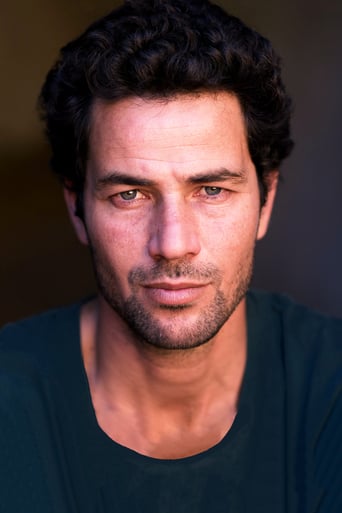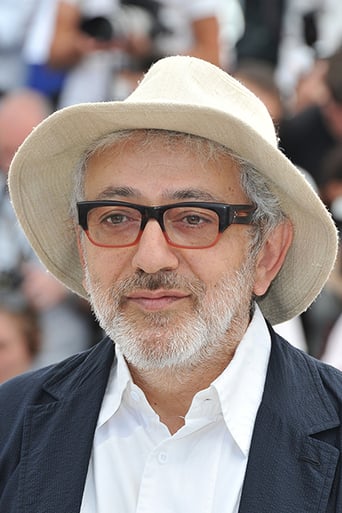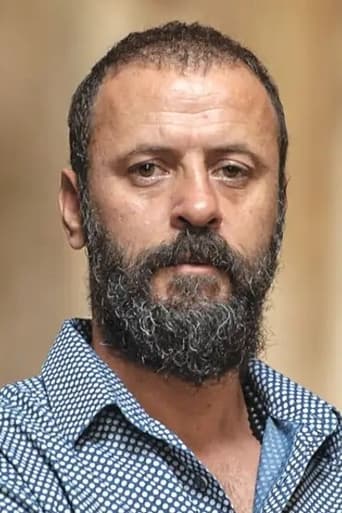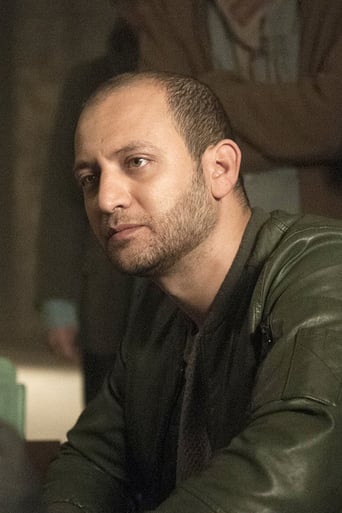Jeanskynebu
the audience applauded
Spoonatects
Am i the only one who thinks........Average?
Keeley Coleman
The thing I enjoyed most about the film is the fact that it doesn't shy away from being a super-sized-cliche;
Portia Hilton
Blistering performances.
Sharine Atif
This film has a very distinguished style and sense of humor for such a dark topic on the conflict of Israel and Palestine. It reflects three generations of the conflict through the perspective of Es (the protagonist) who plays a child, a teenager and an elder man. He never speaks perhaps as a metaphor representing the voiceless. One thing I was also able to appreciate as an Egyptian audience, the Egyptian songs by Laila Mourad and Mohamed Abdel Wahab, as well as some Egyptian news references, like on the death of Egypt's President Gamal Abdel Nasser in 1970. Something that a Western audience may not at all experience in the same way a Middle Eastern or Arabic Audience would, is almost like a cheery on the icing for people of that culture, a little gift made exclusively for us, that only we can feel nostalgic about and understand the reference to that culture and era. This film portrays the issue as a gray issue and does no only show the oppressive and inhuman acts of the Israeli Militants, like when they throw Es' father off a cliff. A few scenes show a very human side to them as well, like in the scene when they call out to stop a dance party because of curfew, the first idea that came to mind was the cultural deprivation, but when the military figures start dancing to the music track, it highlights that both sides unite by liking the same music. In another scene, when Israeli military move furniture items onto a truck, the listen to music and smoke cigarettes, somehow very subtly reveals them as ordinary military base figures on duty, it does not look so different from Egyptian bases. He also does not glorify all Palestinians as victims. We get to see a Palestinian who joins the Israeli military and is perceived as a traitor, and called out on it, but he explains later how he needs the work to feed his family. Another very interesting portrayal of how a land under an occupation becomes so natural and part of the backdrop and landscape of the environment, like in the scene when a guy on the cell phone who walks back and forth is pointed at with a tank tracking his every move. The guy does not react at all. This film had a very promising subtle message that the issue is gray and complicated and it seems to be a wish to focus on the good sides in both sides and bringing people together.
Shereen1111
This film has a very distinguished style and sense of humor for such a dark topic on the conflict of Israel and Palestine. It reflects three generations of the conflict through the perspective of Es (the protagonist) who plays a child, a teenager and an elder man. He never speaks perhaps as a metaphor representing the voiceless. One thing I was also able to appreciate as an Egyptian audience, the Egyptian songs by Laila Mourad and Mohamed Abdel Wahab, as well as some Egyptian news references, like on the death of Egypt's President Gamal Abdel Nasser in 1970. Something that a Western audience may not at all experience in the same way a Middle Eastern or Arabic Audience would, is almost like a cheery on the icing for people of that culture, a little gift made exclusively for us, that only we can feel nostalgic about and understand the reference to that culture and era. This film portrays the issue as a gray issue and does no only show the oppressive and inhuman acts of the Israeli Militants, like when they throw Es' father off a cliff. A few scenes show a very human side to them as well, like in the scene when they call out to stop a dance party because of curfew, the first idea that came to mind was the cultural deprivation, but when the military figures start dancing to the music track, it highlights that both sides unite by liking the same music. In another scene, when Israeli military move furniture items onto a truck, the listen to music and smoke cigarettes, somehow very subtly reveals them as ordinary military base figures on duty, it does not look so different from Egyptian bases. He also does not glorify all Palestinians as victims. We get to see a Palestinian who joins the Israeli military and is perceived as a traitor, and called out on it, but he explains later how he needs the work to feed his family. Another very interesting portrayal of how a land under an occupation becomes so natural and part of the backdrop and landscape of the environment, like in the scene when a guy on the cell phone who walks back and forth is pointed at with a tank tracking his every move. The guy does not react at all. This film had a very promising subtle message that the issue is gray and complicated and it seems to be a wish to focus on the good sides in both sides and bringing people together.
tieman64
Another masterpiece by Palestinian director Elia Suleiman, "The Time That Remains" chronicles Israel and Palestine's violent relationship. Deftly mixing drama, comedy, history and metaphysics, the film's first section watches as Arab resistance movements take up arms against the newly formed state of Israel. These movements slowly peter out, however, and pretty soon Suleiman's own family find themselves trapped within Israel, their new homeland. Here they eke out a living, and try to shrug off the literal and psychic violence directed at them from the Israeli majority.The film's second half finds Suleiman returning to Israel from abroad. Part of the Palestinian diaspora, he's a man caught out of place and time, his identity seemingly stolen. We watch as Suleiman drifts in and out of spaces, never speaking, slowly confronting the fact that he will not witness Palestinian independence within his lifetime. Perpetually behind enemy lines, his body seems haunted by occupation forces. Ironically, even Jews no longer recognise "their Israel". "Where am I now?" an Israel taxi driver asks, when clouds of fog part to reveal a land whose borders always change.Suleiman's films have always been attacked by Zionist groups. Such attacks epitomise Israel's own deep-rooted insecurity. She was "illegally" formed in the late 1940s, the result of rigged UN votes, a by-passing of the UN Security Council (who shot down Resolution 181 and the UNSCOP proposals), and the violent ejecting of some 750,000 Palestinians from their land before any lawful international consensus was reached. While there is nothing inherently wrong with the idea of "Israel", the sheer speed, inhumanity and tactlessness at which she was created would lead to decades of conflict. Zionists, Arabs, the UN and Britain were complicit in this tactlessness. While many Jews supported Israel's "re-formation", many prominent ones didn't. Albert Einstein would state that "the essential nature of Judaism resists the idea of a Jewish state" and was deeply "afraid of the damage Judaism would sustain by this new nationalism". Lessing Rosenwald, president of the American Council for Judaism, would prophetically say in 1944: "The concept of a racial state – the Hitlerian concept - is repugnant to the civilised world. I urge that we do nothing to set us back on the road to the past. To project at this time the creation of a Jewish state or commonwealth is to launch a singular innovation in world affairs which might well have incalculable consequences."Regardless, 55 percent of Palestine was, in an instant, taken by a Jewish population who had previously controlled 7 percent. The Palestinian majority, and their right to self determination, was swiftly ignored. Many massacres were committed in these early years (Deir Yassin etc), acts of ethnic cleansing which snowballed into the 1948 Arab-Israeli war, which saw Israel capturing 78 percent of Palestinian land. Towns were obliterated and renamed, maps were redrawn and hundreds of thousands of Palestinians became refugees. Next came the Sinai/Suez war (1956), when Israel, Britain and France set about bombing Egypt and invading the Sinai peninsula. After years of further squabbles, the Six Day War began in 1967 with Israel launching surprise air-raids on Egypt. Israel swiftly occupied the last remaining 22 percent of Palestinian land, as well as parts of Egypt and Syria (the Golan Heights, never returned). Of this attack, Israeli Prime Minister Menachem Begin would say: "The Egyptian army concentrations in the Sinai approaches did not prove Egypt was really about to attack us. We must be honest with ourselves. We decided to attack them." Henceforth, Arab/Israeli relations only get worse.The 1973 war followed, this time started by Egypt and Syria. Contrary to common portrayals, this war did not involve an attack on Israel, but saw Egyptian/Syrian forces confining their operations to sovereign Egyptian/Syrian lands that had been occupied by the IDF since 1967. As for Palestine, it would increasingly come to resemble a giant concentration camp, walls and checkpoints erected, its infrastructure annihilated and more of its land slowly confiscated. Meanwhile, roughly 8 million dollars a day would flow from the US to Israel, the tiny nation swiftly becoming a regional superpower.Over the decades, numerous peace plans would be drawn up (most famously UN 242), most of which were rejected by Israel/the US for very specific reasons: the fear that a Palestinian majority will develop within Israel ("the demographic problem") and the fear that acquired land and settlements, all of which are deemed illegally acquired by the International Court of Justice, will have to be returned ("the withdrawal problem"). Since 1976, there has been overwhelming international consensus in support of a two state Israel/Palestine in keeping with internationally recognised borders, even though this grants Palestine far less land than it "deserves". The consensus includes Arab states and the Organisation of Islamic States. The US and Israel have blocked these proposals for almost 4 decades.The Palestinian Liberation Organisation was formed in 1964. Since 1974 it has been recognised by the UN as the "government" of Palestine. Israel and the US categorise it a "terrorist organisation". The PLO would recognise Israel's right to exist in peace in 1993, accepting UN242 and rejecting all violence and terrorism. Also "representing" Palestine is Fatah, a major political party within the PLO, and Hamas, an ultra right-wing offshoot of the Muslim Brotherhood, at times backed by Britain/Mossad to essentially destroy the PLO and provide justification for Israeli counter-violence. Israel would also invade Lebanon several times (as well as mounting hundreds of illegal incursions), all in an attempt to expel the PLO from Lebanon, dethrone the Lebanese government and install pro-Christian leaders (Bachir Gemayel). The militant organisation, Hezbollah, was formed in response to these invasions. Israel would also back the South Lebanese Army and the Kataeb Party (the Lebanese Phalanges Party), violent right-wing sects. These groups used the 1982 Israeli invasion of Lebanon as cover for their slaughters of Palestinian refugees. The point? Talk, think and deliberate, before drawing lines on maps.8.5/10 – Masterpiece.
nyshrink
This film, like most Elia Suleiman films, uses real time, absurdity, symbolism and scenes from Suleiman's life, at the same time portraying history and current events. As typical of Suleiman it is also a very personal film, the most personal of the ones I've seen (Divine Intervention, Chronicle of a Disappearance). It is a reminiscence of his family from the time of 1948, when the state of Israel was created on the land called Palestine, to the present day.The film covers events including the war of 1948, the death of Nasser, the resistance against Israeli occupation, and the deterioration of Palestinian society in recent times. It is filled with Suleiman's typical tragicomic scenes of interaction between Israelis and Palestinians. It is a very sad film, however, the humor that runs through the film, and the suspense that is created by filming in real time, keep the film engaging even though like Suleiman's other films the pace is somewhat slow.






